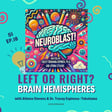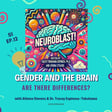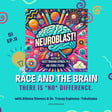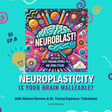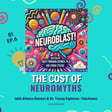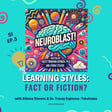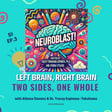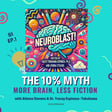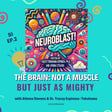Become a Creator today!Start creating today - Share your story with the world!
Start for free
00:00:00
00:00:01

Bilinguals: Are They More or Less Intelligent?
This episode of Neuroblast debunks the outdated myth that bilinguals are less intelligent. Athena and Tracey explore how modern neuroscience reveals bilingualism actually boosts brainpower—enhancing memory, executive function, and long-term cognitive health—while also celebrating its cultural and social benefits. Bilingual brains aren’t weaker—they’re supercharged.
Original music by: Julian Starr
Transcript
Introduction to NerdLast and Episode Topic
00:00:00
Speaker
[Spanish] Welcome To *Neuroblast*. Today We're Talking About Something Incredible. Is It Possible That Bilingual People Are Less Intelligent Than Monolinguals? Crazy, Right? Well, Let's Debunk This Myth Right Away. [English Translation]: Hello and welcome to Neuroblast! Today we are talking about something incredible. Is it possible
00:00:19
Speaker
It's crazy, right? Let's go to myth immediately. Oh, yeah.
00:00:25
Speaker
Oh, yeah.
00:00:43
Speaker
And those of you who are wondering, yes, you've got the right podcast, you do. Don't change that dial. Do you dial anymore? There are no dials on your phone.
Myths About Bilingualism
00:00:57
Speaker
But we just wanted to start you off with a little taste of bilingualism. Today we are tackling yet another wild myth that I've never heard of that bilinguals are somehow less intelligent than monolinguals.
00:01:17
Speaker
Ah, I'm sorry. Say what now, Tracy? Did you make up this myth so that we could do an episode? Not at all. Actually, comes really strongly out of the 60s, 70s, 80s, where we really thought that, um, just if you had a pie in your brain for language,
00:01:39
Speaker
And God forbid I cut that in half. So you're only going to be, you know, you're going to be bilingual, means going to have half the ability language that you could possibly have. And so we used treat people, in bilingual education programs, we used to say, you know, kind of, oh, that's too bad. We're sorry.
00:01:56
Speaker
And now we realize almost the opposite is true. - The extended working memory that's increased by speaking or knowing multiple languages is absolutely brilliant and helping people maintain their native languages as well as learn additional languages is is also something that should be a general school policy. So we've come a long way since the 70s, but definitely that is is a real myth.
00:02:20
Speaker
We did not introduce ourselves. Oh, hi, I'm Athena. Yeah
00:02:29
Speaker
Who the hell are you talking to me? Oh, yeah I was just thinking, there introduction, but we usually we do something other, we do something that I always remember that it's hard for me to do.
00:02:41
Speaker
No, I think we just going and think. They know who we are. Tracey, who are you? What you do? ah Well, I'm Tracey Tokuhama Espinosa.
Tracy Tokahama Espinosa's Multicultural Journey
00:02:52
Speaker
And if you notice from my hyphenated last name, Tokuhama Espinosa, half Japanese and married to an Ecuadorian. I love this topic of bilingualism and multilingualism. And I raised my my three kids in several languages, as well, so it's something close to my heart.
00:03:12
Speaker
So, how many languages do you know? Not that there was ever any doubt that you don't know your stuff. Well - sometimes, like this morning, I can feel really confused about my own English - but I do speak Spanish and have tried very hard to learn a good level of French and German.
00:03:37
Speaker
And I am half Japanese, so I did spend a good deal of my life trying to dig into the roots of my own language. But I wouldn't say I definitely um have more than a basic rudimentary understanding there. But, um, I love languages. I love the idea that if, ah, if you were to come down as a martian and look at our planet, you'd see that all languages are so similar, believe it or not, all maybe 6,000, 7,000 languages, depending on whether we count dialects or not.
00:04:06
Speaker
are very, very similar. They all have verbs, objects, and subjects. They just have them in different orders. And so a martian might say, well, all of these things are so simple, you know, they all look the same. The languages look the same. Whereas we think languages are so different, right?
00:04:20
Speaker
But your brain is sort of organizing them in, ah, in a similar way. So I love this topic of languages. I just think it's a, ah, beautiful way to sort of understand yourself is through all the words you can use. And if you can use words in different languages, I think that there's a benefit there. So this is why it shocked me as well.
00:04:38
Speaker
When I was growing up in Berkeley, California, and I had my first chance to vote, and on the ballot I could choose from amongst dozens, if not hundreds of different languages to - - to do my first ballot in. And that's because in the San Francisco Bay Area, there was a whole lot of different languages and people were allowed to to vote in all of their different languages. And so there was a dozen different choices there on the ballot and you could vote in Chinese or in Spanish or in other languages.
00:05:07
Speaker
and it was a big controversy at that stage of the game. And so how is it that we, you know, what makes you American? Is it having a national language? And it's funny, United States is the only large industrialized nation to not have an official language. We do not have, English is a default de facto language of the country, but it's not a national language. So,
00:05:30
Speaker
different states do different things related to languages.
How the Brain Manages Multiple Languages
00:05:34
Speaker
So, um, anyways, it's fascinating to see what goes on in your brain, in a bilingual brain, in a multilingual brain versus what's going on in a monolingual brain.
00:05:43
Speaker
So let's talk about that because I am learning my fourth language. Two, I'm stronger at than the third, and I'm on number four. And I do notice that when my teacher shows me a pencil, I immediately wanted to say lapis, which is pencil in Spanish, my second language, and and not the language that I am learning at that moment.
00:06:15
Speaker
So what is going on in the bilingual, multilingual, polyglot brain. There are so many wonderful studies that are being conducted to actually see what goes on between first, second, third, fourth languages, fifth languages, and why it is that people sort of dip into their most recent or their strongest languages when they are trying to add on to other languages.
00:06:39
Speaker
And there's a big difference depending on, believe it or not, the structures of the languages. So, if you are learning a language that is similar to another language, um it it's easier to to confuse them or to cross over. This is why if you are learning, um you know, so you've got...
00:06:56
Speaker
if you've got Korean and you've got Spanish going on in your brain and you know Spanish quite well, you have rehearsed a track of retrieval for an equivalent word um to the Spanish.
00:07:08
Speaker
But if you're learning Korean, if you are doing it in like written form or whatever, you're going to box that in a totally different neural network in your brain than you would the oral comprehension of the word that you're looking for, right? And so how you learn the languages, what you're using them for, how frequently you use them does change the neural tracks. And some of the best work in this field is being done by someone called um Ellen Bialystok, who's looked at the bilingual brain for a really long time.
00:07:37
Speaker
I'd say that her, one of the predecessors of that she really built a lot of work on is Michel Paradis, who did a lot of work on bilingual aphasias. So when people lost language because they had a stroke in their brain, did they recover their first language, second language, third language? What order did they recover languages in depending on where damage was done?
00:08:01
Speaker
And that kind of inspired lot of the really interesting work that Bialystok is doing now looking at how different types of things are strengthened through languages, not only the neural tracks of these sub elements of language, but how your brain needs to have really strong executive functions, working memory, for example, to be able to do well in in another language. And so how there's these side benefits, this bilingual edge, as she calls it, that is built up over time in the brain because of these distinct neural pathways. And so what's going on in the brain between bilinguals and monolingual brains differs based on the language origins, the frequency of use, whether or not you're fluent in the languages. and
00:08:46
Speaker
So people who are perfectly bilingual don't hesitate, don't pause, don't translate. They're just, you know, they have this, the lexical access in the brain is basically there for all words that you know, all the words and all the languages.
00:09:00
Speaker
Your brain really spends a lot of energy trying to figure out which slice of that, which language, um, choice you need to have when you're reaching in to look for that particular word, ah which is really fascinating. So how is it that your brain has that discipline to find lexical access for one foreign language versus another foreign language in your brain is really some wonderful and ongoing research right now.
00:09:25
Speaker
So this also why when I now go to a Mexican restaurant in Cambridge, Massachusetts, because I don't think there are any good Mexican restaurants in Cambridge, England, when I walk into these Mexican restaurants and I know I know Spanish, I know I took Spanish for eight years, I know how to give directions in Spanish and they say, do you want cilantro?
00:10:01
Speaker
I say 'nay', which is yes in Korean, because that is the language I'm working on now. Is that what's going on? Yeah, your brain adapts to what it does most. And so frequency is really a huge factor in retrieval, right? So if you are currently learning another foreign language, that's definitely going to cause interference with your prior foreign languages until you dominate a level of fluency in the next language, right? And then then you'll have this quicker retrieval through this big lexical pole in your brain. So
00:10:36
Speaker
Your mental lexicon is is one. It's basically all this access to all the words you might know, all of your general mental schema is, is contributed to by all the different languages you know. So your concept of pencil or cilantro or all these other things is a single understanding. Your mental schema is built bigger by having your different, you know, languages access to it. But the words there are in this kind of, you know, space in your brain where your brain has to then choose which of these languages am I going to
00:11:10
Speaker
Use when I'm actually talking or communicating. And that becomes more and more, um that's much easier with fluency. And the fluency only happens with, you know, a lot of repetition. And again, the immediacy, if you've only been looking at Korean, that's the easiest pull.
00:11:27
Speaker
That's the easiest. So your brain adapts to what it does most, which is really kind of funny. Um, I had a similar, a similar problem when I went back to, went to, to Japan.
00:11:38
Speaker
and my husband was, was, was stationed there and so I tried very hard to get my Japanese down. In languages, you don't just have words, you also have what are called fillers. So in English, we sometimes say, um, um, or well, or, uh, we sort of have fillers. Well, in Japanese,
00:11:57
Speaker
the filler was very embarrassing when I was speaking Spanish because the filler in Spanish is to say, ano nay which means ass. So basically you would say, ano nay and I would, I would stop speaking in Spanish and put in that in the middle and inject ah an ass into every, every sentence I had, because I was just so used to that kind of a filler in another context. So it wasn't until, you know, we were there for a couple of weeks that I started remembering the fillers in Spanish as opposed to and - in Japanese. So basically you're saying in order for me to get my Spanish and Arabic back, I'm going to have to become fluent in Korean.
00:12:46
Speaker
Well, if you did that, it would make it, it's lower cognitive load to have that reach into your lexical, ah your your mental lexicon, right? So frequency, repetition, and practice is basically the way you get to fluency.
00:12:58
Speaker
And so the more frequently you are in contact with that language and you use it, the repetition of certain words that make it habituated and very quick pull of those vocabulary words, and just practicing in real life context is what's going to make it easier to get that back out of your brain.
00:13:15
Speaker
Okay, I definitely did not read full terms and conditions of learning a fourth language when I signed up.
00:13:27
Speaker
No, it is tough. But hopefully the benefits outweigh this - point
Cognitive Benefits and Challenges of Language Learning
00:13:33
Speaker
of learning and embarrassing myself in um Spanish and Mexican restaurants because this really is one of the greatest gifts you can give your brain is learning another language, isn't it?
00:13:52
Speaker
It absolutely is. And I think that this, you know, your example gets to the real big, um, distinctions. People wonder what the differences are between learning languages as children versus adults. And there's a wonderful book that was out about five years ago by Susan Barron Hauwaert who did research on trilingual or multilingual brains. And when she interviewed families, she found that the kids who had been brought up with three, four languages at a time,
00:14:20
Speaker
Versus when she interviewed the parents, who she asked the kids, well, how was this? What what was the experience like? And the kids were like, no, it was great. It was wonderful. Hey mom, dad, how come you didn't give us even more?
00:14:32
Speaker
which is very interesting. And where the parents, when she interviewed the parents, they were totally freaked out at the whole prospect. She thought they- the kids- the parents didn't know, are we messing with our kids' brains? Are we going to make this worse?
00:14:44
Speaker
Whereas the kids found that this was very easy, natural, and they had real life context for each of their languages. They might have a language at home, a language at school. They were learning a foreign language.
00:14:54
Speaker
The nanny spoke another language or the one of the parents spoke another language. And they were able to naturally have that, you know frequency, repetition and practice come in and they learned very quickly.
00:15:05
Speaker
So that's a huge difference, um though, but you know, adults when learning in a a language as as you are right now as an adult, um doesn't necessarily have all those natural contexts within which to use and to have that natural um repetition and practice.
00:15:21
Speaker
So there is a big difference. It's not that children's brains are more adept to learning foreign languages. You can and do learn foreign languages until you die. In fact, there's great benefits into actually learning foreign languages when you're older. They did a fun experiment. You know, what keeps you cognitively youthful? You know, is it doing crossword puzzles or Sudoku?
00:15:44
Speaker
Is it taking care of a plant? or taking care of a young, a little pet, or learning foreign language. What would be better for cognitive, to stave off cognitive decline, to help you live a you know better life mentally and and with your brain?
00:15:59
Speaker
And obviously all those things are great, right? But for different reasons. If you take care of a plant or an animal, you don't want to die. You, you stay healthy because if you die, the the pet dies, right? And so that's just sort of a guilt trip.
00:16:15
Speaker
If you do crossword puzzles or Sudoku, those are also beneficial, but they're a single way of exercising your brain. Whereas learning a foreign language is constantly working working memory, cognitive control, inhibitory control, creative flexibility. I mean, all of these different things are going on at the same time. And so, um, foreign languages are are really the hardest, one of the hardest things to do, aside from literacy. Learning to read and write in a foreign language is probably the hardest thing you can ask your brain to do.
00:16:47
Speaker
Yeah, and having dealt with three alphabets in four languages, um I can definitely understand that.
00:16:58
Speaker
I can't imagine a world without bilingualism, where a world without bilingualism that is necessary and enhancing life, but we know that there are plenty of people that speak in one language,
00:17:18
Speaker
So what is the real-life impact of this myth?
Cultural and Political Aspects of Language
00:17:24
Speaker
It's not that anyone's more smart or less smart. There might be different opportunities.
00:17:33
Speaker
But this myth that bilinguals or multilinguals are somehow less smart, is that still having a real-world impact today?
00:17:44
Speaker
Well, I think that there's um there's something linked to that. It's not exactly that we still think that multilinguals are are less intelligent or whatever, but you know as as you mentioned before, we still think, okay, the immigrant who comes across the border, they're obviously dumb because they don't speak English. Well, they might speak their own language and another another language of their village and other languages as well.
00:18:07
Speaker
And actually puts them at you know at a benefit. But adding on English, showing that you can do things in English, for example, in the States has become a really big thing.
00:18:18
Speaker
But this is attached to something much more political. Um, there is a... I believe in some circles of what's called linguistic hegemony, which in which you have a ah dominant language. This language is better than another language. Historically, we have had um things that are called lingua franca. These are the the common world languages. And before it used to be Latin, um, and then it used to be French.
00:18:40
Speaker
And now it is currently English, but it's the language that most trade and diplomacy are done in, um, but also these days, it's business and military things are done like that. So we tend to think that, oh, this language is better or more worthy or more important than other languages, which is just not true from the brain's perspective. - And there's a big political conversation going on.
00:19:06
Speaker
in Ecuador about whether or not you should have bilingual education. Um, but what they mean is to have an indigenous language as well as Spanish. And what other people mean is that you should have Spanish and English.
00:19:18
Speaker
And they when they asked my opinion, I said, they I don't care. I really don't. It doesn't matter what language, having an additional one is - beneficial. And we know that people who do bilingual studies, for example, do better in math exams.
00:19:34
Speaker
Um, so people who have bilingual skills tend to score slightly higher than other people in other areas, mainly because they have that cognitive edge, that benefit of having extended working memory. And so we know that, um, there's definitely benefits to having additional languages. There's definitely cultural problems. And there is this idea that there's a - a linguistic hegemony that one language is better than another, or you know,
00:20:02
Speaker
These days saying English is actually more useful. It could be depending- depending on your goal. But for as far as the brain is concerned, it would love to learn any language. But as you know, do you remember, Athena, back in the day there was an attempt to try to have a single language at the United Nations to try to say, okay, because people were saying, this should be an official language, this should be an official language, this should be an official language.
00:20:26
Speaker
And then somebody else said, let's invent one that we can all agree on. It was called Esperanto. Yes. Yes. I do. Now, why do you think it didn't really fly? Probably because everyone was too busy that they didn't have time to learn another language. Well, it was a super easy language to to learn. So there was- it really had a very low barrier to to learning the language.
00:20:51
Speaker
The thing is that language carries it is probably the biggest cultural artifact we have. And it carries a ton of luggage with it. And people love to use their native languages and they love to speak foreign languages with their native accents because it shows where they came from. So we know that language is a huge cultural artifact as well and carries a lot more weight.
00:21:13
Speaker
So it's not just whether or not it's a functional exchange, but um it does mean a lot, you know, culturally and and historically, there's a lot of reasons people don't want to give up their native languages.
00:21:24
Speaker
But it's important.
UN's Language Recommendations for Peace
00:21:25
Speaker
And this is why also we force people, we used to in the 70s and 80s, remember kids put into the bilingual program at my public high school were kind of looked down upon and they went into the bilingual track and they would stay there for the entire of the entirety of their their studies instead of transferring out, instead of then being able to integrate into.
00:21:48
Speaker
into the regular classrooms. And so that's changed a lot. Bilingual education and multilingual education has improved a lot in the States. It's the norm throughout Europe. Um, but I think we need to get better at doing that because everybody should speak,
00:22:01
Speaker
Um, the United Nations suggests you should speak at least, and ah well, that you should speak your native language, you should speak an international language, and you should speak a border language. So every year in February, they celebrate a UN day of languages in which they hope that everybody speaks their native language, an international language which is a language of the United Nations, one of their former languages, as well as a border. So if you live in the United States, you should speak either French or Spanish.
00:22:27
Speaker
So, their idea is politically speaking, if you could talk to your neighbors, you wouldn't fight with them. So we should all, you know, but cognitively speaking, I would say that everybody should learn at least one other language and use it regularly. It's great for your brain. So what you're doing, Athena, and having that small little blip on the radar at the Mexican restaurant is minor compared to all the benefits that you're doing your brain.
00:22:53
Speaker
Oh, thank you for that, Tracey. There's so much that I think you and I can definitely go on for hours about this, um, but we both had to clear goal that, unlike some podcasts, ours were not the 18,000 hours long.
00:23:11
Speaker
Thank you to our audience as well for joining us on Neuroblast. If you find this episode interesting or insightful, please subscribe, share with your friends who speak one language or more or none at all, although I don't know what that would be like.
00:23:33
Speaker
But I'm sure they would be interested interested in this too. We - appreciate your support 100%. [Korean]: 내가 똑똑해서 한국말 할 수 있는 거예요! / English translation]: I can speak Korean because I'm smart! . . . . . . . . . . Wow! Look at you. You've got Korean going, you've got your Spanish, you didn't mix that one up with the cilantro and the Spanish. Nay, nay, nay.
00:23:57
Speaker
Bilingual brains for the win! Yay.
00:24:09
Speaker
Bye.

